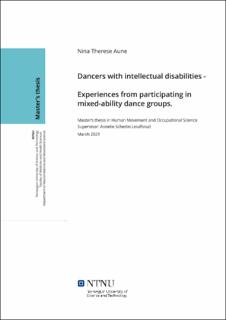| dc.contributor.advisor | Leiulfsrud, Annelie Schedin | |
| dc.contributor.author | Aune, Nina Therese | |
| dc.date.accessioned | 2021-09-25T16:28:26Z | |
| dc.date.available | 2021-09-25T16:28:26Z | |
| dc.date.issued | 2021 | |
| dc.identifier | no.ntnu:inspera:67456512:24224033 | |
| dc.identifier.uri | https://hdl.handle.net/11250/2783151 | |
| dc.description.abstract | Mål: Målet med denne studien var å få kunnskap om opplevde fordeler og utfordringer for personer med utviklingshemming som deltok i ulikkroppede dansegrupper (mixed-ability dance groups/MADGs) sammen med funksjonsfriske.
Forskningsspørsmål: 1) Hvilke erfaringer har dansere med utviklingshemming som deltar i dansegrupper med blandede evner (mixed-abilities)? 2) Hva er de potensielle fordelene og utfordringene med slik danseaktivitet knyttet til faktorer rundt helse og sosial deltakelse?
Forskningsdesign og metoder: Dette var en kvalitativ internasjonal studie, hvor data ble samlet inn ved hjelp av semi-strukturerte intervjuer og observasjoner av deltakerne i deres danseaktiviteter. Refleksiv tematisk analyse (RTA) ble brukt til å analysere dataene. Åtte dansere med utviklingshemming i alderen 20-39 år inngikk i studien.
Resultater: Følgende fire temaer ble identifisert: betydning; kreativitet; helse og velvære; sosial deltakelse og inkludering. Dans i MADGs var både knyttet til sterke følelser og sosial deltakelse. Å være kreativ i dans ble beskrevet som morsomme og utfordrende måter å uttrykke seg på. Deltakerne opplevde økt autonomi, frihet og egenutvikling, og at dette bidro til deres velvære. Sosial inkludering ble fremmet gjennom at deltakerne var aktive og bidro til gruppenes utvikling.
Konklusjon: Erfaringene fra personer med utviklingshemming som deltar i MADGs var positive og meningsfylte for dem. Dans i MADGs var gunstig på det sosiale nivået, og det påvirket deres velvære og egenutvikling positivt. Studien har gitt kunnskap om viktige aspekter å vurdere når man lager et inkluderende miljø for personer med utviklingshemming.
Nøkkelord: inkluderende dans, utviklingshemming, dans, aktivitetsvitenskap og deltakelse. | |
| dc.description.abstract | Aim: The aim of this study was to gain knowledge about the benefits and challenges of participation in mixed-ability dance groups (MADGs) for persons with intellectual disabilities (ID).
Research questions: 1) What are the experiences of dancers with intellectual disabilities of participation in mixed-ability dance groups? 2) What are the potential benefits of such dance activity linked to factors around health and social participation?
Research design and methods: Data was collected using qualitative interviews and observations of participants in their dance activities. Eight dancers with intellectual disabilities aged 20-39 years old were included in the study.
Results: The following four themes were identified as important: Meaning; Creativity; Health and well-being; Social participation and inclusion. Dancing in the MADGs was perceived as meaningful and associated with strong feelings and social participation. Being creative in dance was described as fun, and as new and challenging ways to express themselves. Enhanced autonomy, freedom, and self-development were important to their well-being. Social inclusion was enhanced as the participants were actively contributing to the development of the MADGs.
Conclusion: The experiences of the persons with ID were that participation in MADGs was positive, enjoyable and meaningful for them. Dancing in MADGs was beneficial on the social and interpersonal level, and it affected their well-being and self-development positively. The study has provided knowledge about factors to consider in facilitating a more inclusive environment for persons with ID.
Keywords: mixed-ability dance, inclusive dance, intellectual disability, occupational science and participation. | |
| dc.language | eng | |
| dc.publisher | NTNU | |
| dc.title | Dancers with intellectual disabilities - Experiences from participating in mixed-ability dance groups. | |
| dc.type | Master thesis | |
